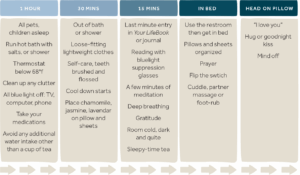In our fast-paced world, sleep is often the first thing we sacrifice. But the truth is, if you want to eat healthier, move more, manage stress, or simply feel more energized throughout the day, prioritizing sleep is essential.
Most adults need at least 7.5 hours each night, and many feel–and function best–with up to nine. While we sleep, our brain goes through a series of important stages that make up a complete sleep cycle. We typically experience four to six 90-minute cycles a night. These cycles support muscle repair and immune function, as well as memory consolidation and emotional regulation.
Accumulating sleep debt (the amount of sleep we sacrifice, hour by hour each night) can lead to a range of issues over time, including a lack of focus, diminished cognitive performance, and can contribute to mental and emotional health issues.
So, how do you create more restorative sleep?
Rituals play an important part in your Habits of Healthy Sleep. Your evening ritual is one of them, and it sets you up with uninterrupted hours of healthy sleep. In the evening ritual, you will go from being alert and focused to calm and mellow, leading you into a deep sleep. Here is an example of a Bedtime Ritual in the Twilight Hour:

As you get better at planning your transition time, you will feel your stress level decreasing, preparing you for the twilight hour to get your body ready for sleep.
Maintain a consistent schedule of bedtimes and wake times, even on weekends, to establish a healthy regimen.
Creating a consistent and restorative sleep schedule doesn’t have to be complicated. Here are a few tips to help you get started:
- Set a bedtime and wake time—and stick to it. Choose times that allow for about eight hours of sleep and suit your chronotype (learn more on page 407 of Dr. A’s Habits of Health). Set reminders on your phone if needed—especially in the beginning.
- Limit caffeine and alcohol. These can interfere with the quality of your sleep, especially when consumed later in the day.
- Make your bedroom a sleep sanctuary. Keep it cool, dark, quiet, and free of distractions. Invest in comfortable bedding and blackout curtains if needed.
- Be patient and consistent. It can take a few weeks for your body to adjust, especially if your current sleep habits are irregular.
Just like healthy eating or creating daily movement, quality sleep is a Healthy Habit that requires intention, structure, and consistency. Sleep isn’t just a passive activity—it’s a powerful tool in your health journey. By prioritizing consistent, quality rest, you’re laying the groundwork for more energy, better focus, stronger immunity, and greater resilience.
A core Habit of Health—and a physical reality—is getting enough sleep. By building healthy rituals around sleep, you create the foundation for thriving in every area of life.